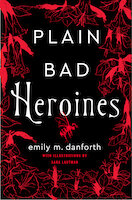5 stars. I feel eaten alive. Wolf Hall is the first in a trilogy about Thomas Cromwell: aide to the king of England during a time of great crisis. England needs an heir. The government needs stability. The Church needs power, and loyalty. The country needs allies, and money. And Henry VIII wants Anne Boleyn.
Cromwell navigates through it all - the fall of his Cardinal, the squabbling nobles, a mercurial king, two queens - using his sharp mind and deep intellect. It is a spectacular work of historical fiction that's focused not on the sun, but the space around the sun - the objects and empty spaces orbiting and swirling around what appears to be the brightest thing in the sky. What it gives, what it takes, what it feeds and what it burns.
I've never fallen in love with historical fiction the way I have with this. Every time I picked it up I felt like I was melting into the story, falling down a well, and as cheesy as it sounds, I felt like I was there. It's rich with detail - Mantel knows her shit - but she includes the fun stuff too; the scandalous jokes, the twists and turns, the melodrama, the innuendos, the sex. This is NOT The Other Boleyn Girl, though I respect Gregory's writing a lot too.
I've read a lot ABOUT this book, because it fascinated me so much and I wanted to skirt on the fringes of this world a bit longer. I noticed a couple of common themes and observations among readers, and I'd love a chance to address them and push back a bit.
First, there seems to be a frequent observation that Mantel writes Thomas Cromwell as cold, calculating, without emotion, ruthless, conniving, manipulative, greedy, power-hungry, and otherwise just generally villainous. While I think it's true that Cromwell was an ambitious and greedy man with a ruthless streak, he used his intellect in ways that were ultimately astonishing. He was complicated, and Mantel writes him as such. I've seen readers question his motives, call him a psychopath, yell at him for "getting over" the loss of his family so quickly, and declare his demise as justified and well-deserved.
It's an interesting interpretation - to cast him in such a bad light - but I would argue that those readers may have been misled by the dryness of Mantel's prose and her approach to the character. It's not that Cromwell had no emotions, she just didn't write about them, or at least not in the way we're used to.
(I should note that I'm not a fan of Cromwell, I don't sympathize with him and I love that Mantel made him grow to be so arrogant, especially toward the end.)
Second, many readers complain that the prose is boring, dense, challenging, difficult, and the pronoun usage is confusing. Yes - absolutely. The pronoun usage tripped me up a whole bunch. But I didn't mind the density or intensity of the writing, in fact, I rather enjoyed having to sing for my supper. To work so hard was rewarding for my brain. So that's a preference thing, or an English Lit major thing, I don't mind going back to re-read passages, but I wish readers wouldn't complain in such an accusatory way. I was blown away by what Mantel was able to do with certain images and motifs - comparing a face to a thumbnail, what people wear under their clothes, a dog pulling at its own collar...
The thing is, this book is so immersive, so compelling, so detailed and strong in its depiction of a fragile society balancing on the edge of a knife, it felt ... well, familiar. Context is everything. I know this story. We all know this story. And that helps, with the names and the faces and the messy nature of the story. But something about this version of it, or the timing of my reading experience ... I recognize echoes of what happened back then today. Not just the threat of illness or plague, but the sense that the walls are always just on the verge of caving in and we can't really trust anyone but ourselves. The moral struggles - the push and pull of desire and ambition and obligation. And more obviously, the soul-crushing terror of watching a leader fail and a country break. Transfer of power comes to mind...
It's like this: when I think of politics under Henry VIII, I think yeesh, messy. Thank god politics has ... *sits back* ... nope, nevermind, still messy.
I wonder why we tend to look back on our ancestors and think we are superior - think of them as primitive, dumb, petty; their mistakes and motives and beliefs far removed from us. On the contrary, I think we are still primitive, dumb, petty. Our technology is advanced, we’ve conquered the planet, and we are able to answer so many questions with science, but we still squabble, we still kill each other uselessly, and we are, as always, just as we were then, ego-driven, shallow, motivated by power and greed and questionable beliefs, following distractible leaders surrounded by sycophants.
When I read a book like this I wonder, should humanity survive the current crisis, what will be written about these times? Who will they write about? Will they look back with contempt and disdain at our misguided communities and think, thank god we’re better? Or will they, like myself, look back and think, we haven’t changed a bit?
"Beneath every history, another history."
Thomas Cromwell has entered the chat.
Wolf Hall on: Amazon | Bookshop.org | Goodreads










